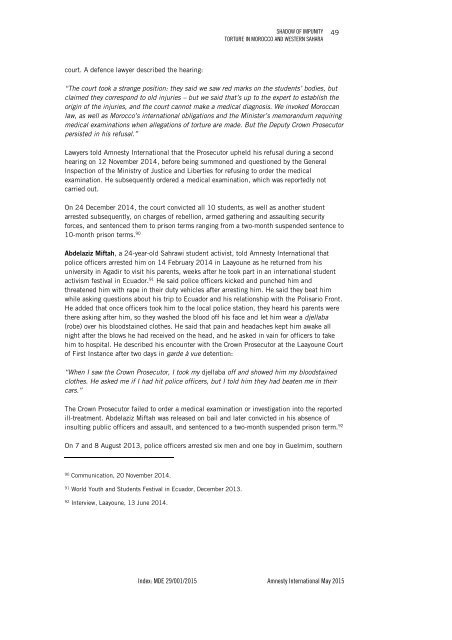7f2vH5qFw
7f2vH5qFw
7f2vH5qFw
You also want an ePaper? Increase the reach of your titles
YUMPU automatically turns print PDFs into web optimized ePapers that Google loves.
SHADOW OF IMPUNITYTORTURE IN MOROCCO AND WESTERN SAHARA49court. A defence lawyer described the hearing:“The court took a strange position: they said we saw red marks on the students’ bodies, butclaimed they correspond to old injuries – but we said that’s up to the expert to establish theorigin of the injuries, and the court cannot make a medical diagnosis. We invoked Moroccanlaw, as well as Morocco’s international obligations and the Minister’s memorandum requiringmedical examinations when allegations of torture are made. But the Deputy Crown Prosecutorpersisted in his refusal.”Lawyers told Amnesty International that the Prosecutor upheld his refusal during a secondhearing on 12 November 2014, before being summoned and questioned by the GeneralInspection of the Ministry of Justice and Liberties for refusing to order the medicalexamination. He subsequently ordered a medical examination, which was reportedly notcarried out.On 24 December 2014, the court convicted all 10 students, as well as another studentarrested subsequently, on charges of rebellion, armed gathering and assaulting securityforces, and sentenced them to prison terms ranging from a two-month suspended sentence to10-month prison terms. 90Abdelaziz Miftah, a 24-year-old Sahrawi student activist, told Amnesty International thatpolice officers arrested him on 14 February 2014 in Laayoune as he returned from hisuniversity in Agadir to visit his parents, weeks after he took part in an international studentactivism festival in Ecuador. 91 He said police officers kicked and punched him andthreatened him with rape in their duty vehicles after arresting him. He said they beat himwhile asking questions about his trip to Ecuador and his relationship with the Polisario Front.He added that once officers took him to the local police station, they heard his parents werethere asking after him, so they washed the blood off his face and let him wear a djellaba(robe) over his bloodstained clothes. He said that pain and headaches kept him awake allnight after the blows he had received on the head, and he asked in vain for officers to takehim to hospital. He described his encounter with the Crown Prosecutor at the Laayoune Courtof First Instance after two days in garde à vue detention:“When I saw the Crown Prosecutor, I took my djellaba off and showed him my bloodstainedclothes. He asked me if I had hit police officers, but I told him they had beaten me in theircars.”The Crown Prosecutor failed to order a medical examination or investigation into the reportedill-treatment. Abdelaziz Miftah was released on bail and later convicted in his absence ofinsulting public officers and assault, and sentenced to a two-month suspended prison term. 92On 7 and 8 August 2013, police officers arrested six men and one boy in Guelmim, southern90Communication, 20 November 2014.91World Youth and Students Festival in Ecuador, December 2013.92Interview, Laayoune, 13 June 2014.Index: MDE 29/001/2015 Amnesty International May 2015


